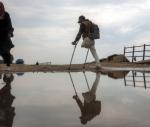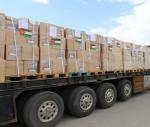You are here
Bringing people into the politics of aid
Sep 08,2018 - Last updated at Sep 08,2018
Jordan has been a beneficiary of economic and military aid since its inception. Although aid currently constitutes around 10 per cent of its budget, the country has received disproportionate attention because of implicit and explicit conditionality associated with it. As the framing of aid globally has shifted from developmental aid focused on increasing basic economic development and supporting human rights to a foreign investment in preventing violence and protecting donors’ interests, the perception of aid has shifted as well. Despite heated elitist discussions behind closed doors, the question on the political price Jordan is paying in exchange for this aid lingers. Is it really worth it?
Today, the Jordanian people’s level of awareness of aid reveals their judgment of how useful this aid is to Jordan and its citizens. In a recent survey of a nationally representative sample conducted by NAMA in collaboration with Konrad Adenauer Stiftung, awareness on aid ranged from as low as 14 per cent to as high as 81 per cent. When asked whether they had heard of an aid programme from a pre-prepared list of donors, respondents showed that the highest level of awareness among Jordanians was of Saudi aid at 81 per cent, followed by knowledge of aid programmes from the Gulf Cooperation Council (GCC) at 73 per cent, the UAE at 67 per cent, Kuwait at 58 per cent, USAID at 57 per cent, EU at 41 per cent, Germany at 23 per cent, Japan at 22 per cent, France at 15 per cent and UK at 14 per cent.
Although the USAID contributes the highest declared aid to Jordan, nearly $1.3 billion, it did not receive the highest level of awareness. On the other hand, Saudi and Arab aid received more awareness than US and other aid programmes. Although Saudi aid has been flowing intermittently since the 1970s, it is currently lower than that of the USAID in volume for various reasons. This runs parallel to the divergence in Jordanians’ position on who the closest ally to Jordan is; the US comes in top spot. However, when asked which country should Jordan increase its collaboration with, Saudi Arabia came first. Both the US and Saudi Arabia have deep interests in Jordan, especially in the realm of regional security and stability.
Usefulness of aid to Jordan and Jordanians ranked as follows: Japanese aid, despite low levels of awareness on its programmes implemented in Jordan, has topped the list of usefulness to Jordan and Jordanians at 78 per cent. This was followed by the USAID at 73 per cent, GCC 72 per cent, Kuwaiti, Saudi and Emirati aid 70-71 per cent, German aid 69 per cent, French aid 67 per cent, UK aid 66 per cent and EU aid 65 per cent. Clearly, Japanese aid does not come near to USAID and Saudi aid in terms of volume, but its usefulness perception is worth examining. Likely, this positive perception is linked to the fact that Japanese aid is not perceived to be conditional. Instead, it may be seen as well-positioned development aid that goes directly to projects of perceived societal value. Conversely, other aid packages are associated with threatening conditionality that may create controversy, especially when it comes to settling regional problems at Jordan’s expense while disregarding core Jordanian local and regional interests.
Aid conditionality is controversial and suffers from negative perception among local recipient populations. Understandably, donors as well as recipients seek to maximise their gains. When donors push too hard, it indicates a few things; serious commitment to their own and/or the recipient’s interest, lack of understanding of the recipient’s priorities and core interests or any random mix of the above. Recipients accept this conditionality either because of dire need or proactive willingness to implement the conditionality. The latter is often framed in the language of strategic partnerships, alliances or economic interests. For example, policies on immigration are increasingly being framed in the language of security rather than human rights and development. As such, the framing of aid shifted from “development aid” to preventative aid used to stop a set of “threats” ranging from migration to radicalisation to terrorism.
Consequently, conscious efforts need to be made to humanise aid and improve its perception as a public good that is beneficial to the human rights of all Jordanian citizens.
The writer is chairman of NAMA Strategic Intelligence Solutions













